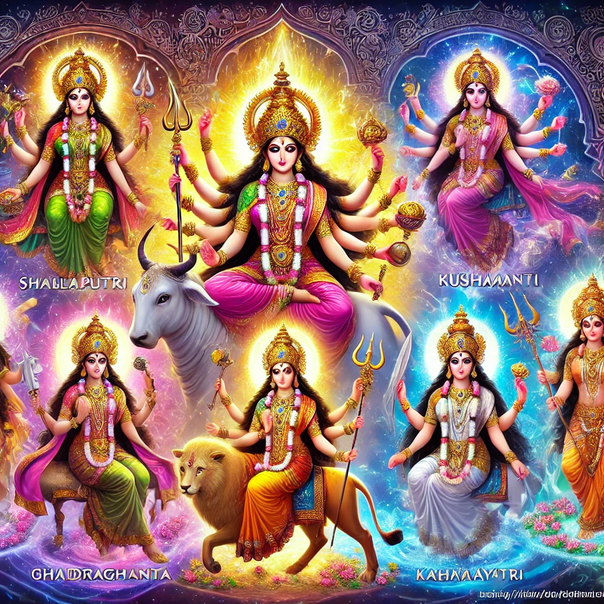
Sanjay Mohindroo
Discover the nine powerful forms of Goddess Durga, worshipped during Navratri, representing divine strength, wisdom, and cosmic energy. #NavaDurga
The Sacred Essence of Nava Durga
Navratri, a nine-day festival of devotion, power, and spirituality, is dedicated to worshipping the nine divine forms of Goddess Durga, known as Nava Durga. Each form represents a unique manifestation of Shakti (divine energy) and symbolizes different virtues. As we embark on this sacred journey, let us explore the significance of each form and seek their blessings. #Navratri2025 #GoddessDurga
1. Shailaputri: The Daughter of the Mountains
Symbol of Purity and Strength
The first form of Nava Durga, Shailaputri, means "Daughter of the Mountains." She is an incarnation of Goddess Parvati, born as the daughter of King Himalaya. Seated on a bull and holding a trident and lotus, she symbolizes stability, strength, and devotion.
Worshipping Shailaputri on the first day of Navratri purifies the mind and soul, leading to spiritual awakening. She embodies the essence of Mother Nature and teaches us perseverance. #Shailaputri #Strength #DivineFeminine
2. Brahmacharini: The Goddess of Meditation and Wisdom
Embodying Knowledge and Devotion
Brahmacharini, the second form, represents penance, knowledge, and spiritual enlightenment. She is depicted walking barefoot, carrying a japa mala (rosary) and a kamandalu (water pot), symbolizing tapasya (austerity) and discipline.
Her worship blesses devotees with wisdom, self-restraint, and determination, encouraging them to stay steadfast on the path of righteousness. She is the ultimate representation of divine knowledge. #Brahmacharini #Wisdom #Meditation
3. Chandraghanta: The Goddess of Courage and Serenity
Destroying Evil with a Divine Roar
On the third day, devotees worship Chandraghanta, who adorns a half-moon on her forehead, resembling a bell (ghanta). Seated on a tiger, she possesses ten arms, carrying powerful weapons, symbolizing courage, grace, and righteousness.
Chandraghanta wards off negativity and blesses her devotees with peace, strength, and bravery. She signifies the perfect balance between ferocity and serenity. #Chandraghanta #Courage #DivineProtector
4. Kushmanda: The Goddess of Cosmic Energy
Creator of the Universe
Kushmanda, worshipped on the fourth day, is believed to have created the universe with her divine smile. Seated on a lion, she holds a kalash (pot) and various weapons, signifying prosperity and vitality.
By worshipping her, devotees are blessed with health, happiness, and divine radiance. She is the source of cosmic energy that drives all life forms. #Kushmanda #Energy #UniversalMother
5. Skandamata: The Mother of Skanda (Kartikeya)
Symbol of Maternal Love and Protection
Skandamata, the fifth form, is the mother of Lord Kartikeya (Skanda). Seated on a lion, she carries her divine son, symbolizing nurturing energy and fierce protection.
Worshipping Skandamata bestows motherly love, wisdom, and strength, helping devotees overcome obstacles. She teaches us the power of unconditional love. #Skandamata #Motherhood #Protection
6. Katyayani: The Warrior Goddess
Defender of Dharma
On the sixth day, devotees revere Katyayani, the warrior form of Durga, who was born to sage Katyayana. Seated on a lion, she holds a sword and lotus, symbolizing righteousness and courage.
She grants fearlessness and strength to overcome challenges, ensuring victory over evil forces. She is a beacon of determination and justice. #Katyayani #WarriorGoddess #Justice
7. Kalaratri: The Fierce Destroyer of Darkness
The Darkest Night Before the Dawn
Kalaratri, worshipped on the seventh day, is the most fierce and powerful form. With a dark complexion, flowing hair, and riding a donkey, she destroys evil forces, negativity, and ignorance.
Her worship blesses devotees with protection, courage, and ultimate liberation from fears. She is the night before spiritual awakening. #Kalaratri #DestroyerOfEvil #DivineFury
8. Mahagauri: The Goddess of Peace and Purity
Symbol of Purity and Tranquility
On the eighth day, devotees seek blessings from Mahagauri, who embodies serenity, kindness, and peace. She is dressed in white, riding a bull, signifying purity and divine grace.
Worshipping her removes past sins and leads to spiritual enlightenment. She bestows inner harmony and prosperity. #Mahagauri #Peace #DivineGrace
9. Siddhidatri: The Bestower of Supernatural Powers
Granting Spiritual Perfection
On the final day of Navratri, we honor Siddhidatri, the giver of siddhis (divine powers). She is depicted seated on a lotus, blessing devotees with wisdom, success, and divine energy.
Her worship completes the spiritual journey of Navratri, bestowing fulfillment, knowledge, and ultimate bliss. #Siddhidatri #SpiritualSuccess #DivineBlessings
Embracing the Divine Energy of Nava Durga
Navratri is a time for devotion, inner reflection, and transformation. By worshipping the Nava Durga, we embrace divine energies that guide us toward strength, wisdom, courage, and enlightenment. Let us celebrate the power of Shakti and walk the path of righteousness. May Goddess Durga bless us all! #NavratriFestival #DurgaMaa #DivineEnergy
